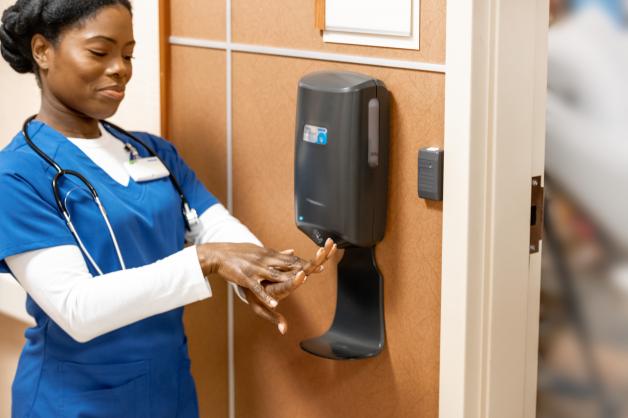
Across the cleaning product supply chain, companies have increased production, adapted manufacturing lines, donated money and resources, and taken extra measures to protect their employees. Here is one such story from Ecolab. See our full COVID-19 Impact Report for more.
Cheryl Littau, Ph.D., Corporate Scientist, and Linda Homan, RN, BSN, CIC, Sr. Manager, Clinical Affairs, are passionate about Ecolab’s hand hygiene compliance monitoring technology. Why? Because when healthcare workers are rushing to help a critically ill patient survive, hand hygiene likely isn’t top of mind – yet it’s crucial to preventing the transmission of infections, especially during a pandemic.
Traditionally, hand hygiene compliance monitoring is done through direct observation by staff or volunteers. When Cheryl performed the task, she found it was easy to miss hand hygiene behaviors by looking away for even a moment.
“75,000 patients die every year from healthcare-associated infections and that’s unacceptable. Hand hygiene is the number one way to prevent the transmission of healthcare-associated infections. We’re spending our time on the things that matter most.”
Linda Homan, RN, BSN, CIC, Sr. Manager, Clinical Affairs, Ecolab
To help hospitals acquire more accurate data, Ecolab incorporated monitoring technology into its hand sanitizer and soap dispensers. The company’s system arms each healthcare worker with a wearable badge that communicates with sensors inside the dispensers and beacons on beds, chairs and stretchers. If the healthcare worker approaches a patient without using a dispenser first, the badge reminds them with a flashing light or an audible signal.
Customizable dashboards collect data on individual hand hygiene behaviors, measure compliance and pinpoint where action is needed. These insights allow hospitals to drive improvements, standardize workflows and keep patients and staff safe.
One dashboard feature that’s taken on particular significance during the pandemic is the contact investigator report. This lets hospitals know in minutes which badged clinicians had contact with a patient or their room – much faster and less labor intensive than looking through schedules.
Even as many infection preventionists have had to divert their efforts as a result of COVID-19, hand hygiene monitoring technology has helped hospitals – like North Memorial Health Hospital in Robbinsdale, Minnesota – maintain fundamental infection control practices. “It’s one less activity we have to directly have our hands on and worry about,” Kelly White, VP, Patient Care and Chief Nursing Officer – North Memorial Health Hospital explained, “so we can shift attention to education around PPE practices and other essential work during the pandemic.”
“If it reminds them to perform hand hygiene and takes care of the healthcare worker and patients that day, that’s huge.”
Cheryl Littau, Ph.D., Corporate Scientist, Ecolab
The pandemic has also required the Ecolab team to adapt how they work as well. Instead of visiting hospitals to update badge settings, the team now uses a recently launched solution to make updates remotely. Cheryl can see this faster, easier process benefiting hospitals even after the pandemic.
Having also contributed to the development of Ecolab’s hand sanitizer, Cheryl has seen how monitoring technology and high-quality hand hygiene products must work together: even with great monitoring technology, healthcare workers will not want to perform hand hygiene frequently if the products are harsh on skin, and even with great products, busy healthcare workers may forget to perform hand hygiene without reminders.
For Cheryl, Linda and the rest of the Ecolab team, the motivation to continue improving their hand hygiene products and technology comes from being able to create greater satisfaction in a robust, end-to-end solution, and ultimately better hand hygiene compliance – a key weapon in helping break chains of transmission.
Across the cleaning product supply chain, companies have stepped up to protect communities from COVID-19.